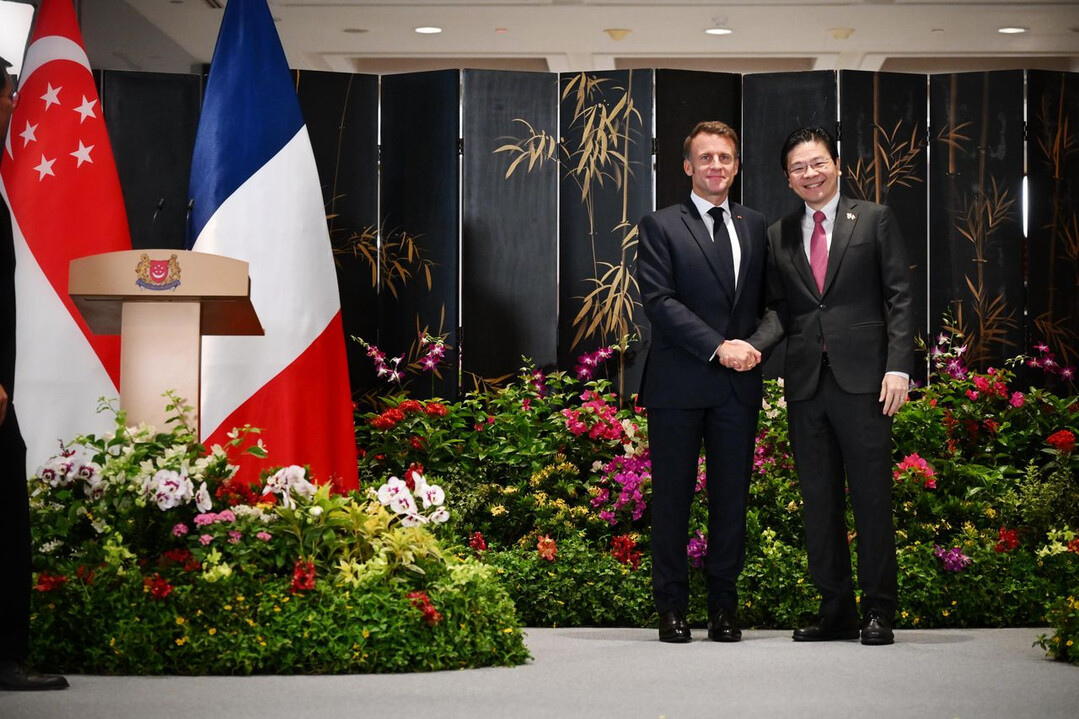
Singapore and France have elevated their strategic partnership, established in 2012, to a "Comprehensive Strategic Partnership (CSP)," marking a new chapter in their bilateral relationship. This is Singapore's first CSP with a European country, signifying the deep trust and future-oriented cooperative spirit between the two nations.
Summit and Exchange of 13 Agreements: Materializing Practical Cooperation
On May 30, the second day of French President Emmanuel Macron's state visit to Singapore, Singaporean Prime Minister Lawrence Wong and President Macron witnessed the exchange of 13 agreements at the Singapore Parliament. These agreements encompass a wide range of areas, including civil nuclear energy, information sharing and defense technology, artificial intelligence (AI) research, security, and deepened cooperation in the aviation and maritime sectors. This will solidify bilateral cooperation under the newly established partnership framework.
At a joint press conference, Prime Minister Wong emphasized the importance of like-minded countries like France and Singapore cooperating in an uncertain world. He specifically mentioned expanding cooperation in new areas such as decarbonization and digitalization, expressing both countries' commitment to jointly address common challenges.
President Macron reciprocated, stating that France and Singapore share many common perspectives and that the CSP reflects the deep trust between the two countries. He added his hope for more effective cooperation in the business sector, also underscoring the importance of economic collaboration.
President Macron arrived in Singapore on May 29 and delivered a keynote speech at the Shangri-La Dialogue, an Asian security conference, on May 30, outlining France's stance on regional security issues. This visit is interpreted as part of France's efforts to strengthen its Indo-Pacific strategy and expand its influence in the Asian region.
Civil Nuclear Energy Cooperation: Energy Security and Climate Change Response
The expansion of civil nuclear energy cooperation between the two countries demonstrates their joint efforts to address global challenges of energy security and climate change. France is a global leader in nuclear technology, and Singapore is highly interested in securing clean energy sources to improve energy efficiency and achieve carbon neutrality goals. Through this cooperation, Singapore may acquire France's advanced nuclear technology and safety management expertise, and potentially consider the long-term development and introduction of its own small modular reactors (SMRs). This will be a significant step towards diversifying Singapore's energy mix and responding to climate change.
Defense Technology and Information Sharing: Strengthening Regional Security Cooperation
Cooperation in defense technology and information sharing is expected to contribute to stability and security in the Indo-Pacific region. France has overseas territories in the region, and Singapore, as a strategic hub in Southeast Asia, is sensitive to regional security issues. The two countries plan to expand information sharing in various areas such as maritime security, cybersecurity, and counter-terrorism cooperation, and enhance interoperability through defense technology development and training exchanges. In particular, these agreements are expected to focus on strengthening practical cooperation between the two countries' military authorities and promoting technological exchanges between defense industries to build joint capabilities for future battlefield environments.
Artificial Intelligence (AI) Research Cooperation: Leading Role in the Fourth Industrial Revolution
Cooperation in artificial intelligence (AI) research demonstrates the two countries' commitment to playing a leading role in the development of AI technology, a core driver of the Fourth Industrial Revolution. France is one of the leading AI research centers in Europe, and Singapore is also actively investing in AI technology development and commercialization through its "Smart Nation" vision. The two countries plan to pursue joint research projects in AI ethics, data governance, and various AI-based industrial applications, and strengthen the AI ecosystem through talent exchange. This will enhance their competitiveness in the future technology race and contribute to finding common responses to the social changes AI will bring.
Decarbonization and Digitalization: Joint Efforts for a Sustainable Future
Prime Minister Wong's mention of cooperation in decarbonization and digitalization indicates that both countries are focusing on joint efforts for a sustainable future. France is actively participating in the European Union's (EU) carbon neutrality goals, and Singapore, as an island nation vulnerable to climate change, is highly interested in reducing carbon emissions and transitioning to renewable energy. The two countries plan to collaborate on the development of decarbonization technologies such as carbon capture, utilization, and storage (CCUS), hydrogen energy, and smart grids, and promote policy exchanges and technological cooperation to accelerate digital transformation. This demonstrates both countries' responsible stance on the global challenges of climate change and bridging the digital divide.
Presenting a New Model for Singapore-Europe Cooperation
The elevation of the Singapore-France CSP is significant as it presents a new model for cooperation between Singapore and European countries. Singapore, as a key ASEAN country and a global hub, seeks to strengthen its role as a bridge between Asia and Europe through partnerships with Europe. France also aims to expand its influence in the Asia-Pacific region, and cooperation with Singapore will further solidify its position in the region. This complementary relationship will be a crucial driving force for the two countries to establish a stable cooperation system and pursue common prosperity in an uncertain international order.
Through this elevation to a Comprehensive Strategic Partnership, Singapore and France have expanded their cooperation beyond traditional areas to future-oriented fields, opening a new horizon for their bilateral relations. This is highly significant as it provides a strong foundation for both countries to respond jointly to global challenges and pursue prosperity together in a rapidly changing international landscape. Attention will now be focused on how the practical cooperation between the two countries will materialize.
[Copyright (c) Global Economic Times. All Rights Reserved.]




























